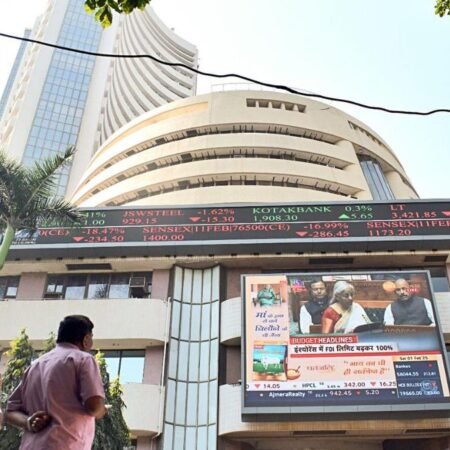Stock market today: The Indian stock market witnessed a widespread selloff on Friday, October 25. The benchmarks—the Sensex and the Nifty 50—declined a per cent each in intraday trade, while the mid-and small-cap segments dropped up to 3 per cent.
Sensex fell 709 points, or 0.90 per cent, to hit the level of 79,356, while the Nifty 50 crashed 1.2 per cent to get to the level of 24,113. The BSE Midcap and Smallcap indices fell 2.6 per cent and 3.2 per cent, respectively, during the session.
The overall market capitalisation of the firms listed on the BSE plunged to nearly ₹435 lakh crore from nearly ₹444 lakh crore in the previous session, making investors poorer by about ₹9 lakh crore in a single session.
Volatility index India VIX jumped over 7 per cent during the session, indicating nervousness among market participants.
The Nifty 50 has been falling for the last five consecutive sessions. The index is now down over 8 per cent from its all-time high of 26,277.35, which it hit on September 27.
Why is the Indian stock market falling?
Here are five key factors that could be behind the recent market fall:
1. Heavy foreign capital outflow
Experts see aggressive selling by foreign portfolio investors (FPIs) as the primary reason behind the market crash. Data shows that FPIs sold Indian equities worth over ₹98,000 crore in October.
Due to the cheaper valuation of Chinese markets, FPIs have been redirecting their funds into Chinese stocks after Beijing announced recent measures to stabilise its struggling economy capital markets.
“The FPI selloff is unprecedented. They had not sold Indian equities worth this much even during the COVID-19 crash and global financial crisis. With the massive, sustained and unprecedented selling by the FIIs, which has touched ₹98,085 crore this month up to 24th, the buy-on-dips strategy is not working,” said V K Vijayakumar, Chief Investment Strategist, Geojit Financial Services.
2. Weak Q2 earnings
India Inc.’s September quarter earnings have been weak, aggravating concerns about the market’s stretched valuations.
Brokerage firm Kotak Institutional Equities, in its recent report, highlighted that the poor Q2FY25 earnings season has indicated subdued trends across various sectors. The brokerage remains concerned about possible risks to profitability and volumes across various sectors because of disruptions and companies’ emphasis on profitability.
According to Vijayakumar, the consensus downward revision in the FY25 earnings estimate and the weak Q2 numbers have soured the sentiments to a slightly bearish mode.
“Q2 numbers have been subdued, and the concern is that along with weak rural consumption, we also have weak urban consumption, as indicated by companies such as Hindustan Unilever and Nestle. Earnings growth in FY25 may be around 10 per cent or even lower than that,” said Vijayakumar.
3. The US election 2024
Uncertainty surrounding the US election is weighing on market sentiment. Less than two weeks before the November 5 election, the latest opinion poll trends show a close fight between Kamala Harris and Donald Trump.
According to Deepak Jasani, the head of retail research at HDFC Securities, if Kamala Harris becomes president, she may carry forward most of the Biden administration’s trade policies. On the other hand, Trump may pursue a more transactional approach with greater scrutiny of the trade imbalance and migration.
“Although it is a close call, there is a possibility of Trump returning. He is a negotiator and may not take steps to damage the market completely. However, if he imposes taxes and higher tariffs, it may impact global trade and the economy,” said Vijayakumar.
4. Geopolitical factors
Evolving situations in the Middle East have been influencing market sentiment. According to a Reuters report, Israel’s military on Thursday said it killed a Hamas commander who took part in the October 7, 2023, attack on southern Israel.
Meanwhile, media reports suggested US and Israeli authorities will meet in Doha to prepare for renewed talks on a Gaza ceasefire deal.
5. Valuation still at uncomfortable levels
Experts point out that the market is still not at justified valuations which is contributing to market selloff.
“We still do not have a buyable comfort despite the recent correction. The current market valuation still remains high,” said Vijayakumar.
Read all market-related news here
Disclaimer: The views and recommendations above are those of individual analysts, experts, and brokerage firms, not Mint. We advise investors to consult certified experts before making any investment decisions.
Catch all the Business News , Market News , Breaking News Events and Latest News Updates on Live Mint. Download The Mint News App to get Daily Market Updates.
MoreLess








No Comment! Be the first one.